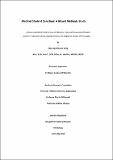| dc.contributor.advisor | Murphy, Andrew W. | |
| dc.contributor.author | Kelly, Maureen Eleanor | |
| dc.date.accessioned | 2015-10-02T10:21:28Z | |
| dc.date.issued | 2015-09-29 | |
| dc.identifier.uri | http://hdl.handle.net/10379/5278 | |
| dc.description.abstract | Selection to medicine is widely considered the single most important assessment of a doctor's medical career. It is a key deciding factor in the composition of the medical workforce. Selectors have a social responsibility to apply best evidence to the design, use and evaluation of selection tools. To be defensible, selection tools must be able to predict future performance, be acceptable to stakeholders and be feasible, practical and affordable.
This thesis uses a multi-phase mixed methods research design to establish the predictive validity of and stakeholder perspectives on two selection tools; the Health Professions Admission Test Ireland (HPAT-Ireland) and Multiple Mini Interview (MMI). It synthesises the research evidence describing stakeholder views of selection tools for medicine (a systematic review), establishes the predictive validity of HPAT-Ireland for communication and clinical skills (an observational study), explores the views of doctors on the job-relatedness and acceptability of HPAT-Ireland (a qualitative study- informed by the principles of grounded theory tradition), demonstrates the feasibility of MMI in an Irish setting (quantitative study) and explores the predictive validity and stakeholder acceptability of MMI in an internationally diverse student population (a mixed methods - explanatory sequential study).
The findings from this programme of research indicate that HPAT-Ireland moderately predicts communication and clinical skills in Year 2 of the undergraduate course. Stakeholder perceptions of the acceptability and job relatedness of HPAT-Ireland are reasonably good, however not uniformly so across its subsections. Concerns exist regarding its potential for negative impact on socioeconomic diversity. MMI was perceived as an authentic assessment with high levels of job relatedness, by both assessors and candidates. However cultural issues and English language proficiency are considered important potential barriers to students from different backgrounds. While MMI is feasible in an Irish setting this thesis did not demonstrate evidence for its ability to predict medical student future performance. | en_US |
| dc.rights | Attribution-NonCommercial-NoDerivs 3.0 Ireland | |
| dc.rights.uri | https://creativecommons.org/licenses/by-nc-nd/3.0/ie/ | |
| dc.subject | Selection | en_US |
| dc.subject | College admission criteria | en_US |
| dc.subject | Medical education | en_US |
| dc.subject | Aptitude tests | en_US |
| dc.subject | HPAT-Ireland | en_US |
| dc.subject | Multiple mini interview | en_US |
| dc.subject | Predictive validity | en_US |
| dc.subject | Stakeholder acceptability | en_US |
| dc.subject | Medical student selection | en_US |
| dc.subject | Mixed methods research | en_US |
| dc.subject | Medicine | en_US |
| dc.subject | School of Medicine | en_US |
| dc.subject | Department of General Practice | en_US |
| dc.title | Medical student selection: a mixed methods study | en_US |
| dc.type | Thesis | en_US |
| dc.contributor.funder | Western Research and Education Network (WestREN), NUI Galway Millenium Research Fund, NUI Galway Further Education Policy | en_US |
| dc.local.note | This thesis concerns medical student selection. It focuses on two tools: an aptitude test (HPAT-Ireland) and a type of interview process (Multiple Mini Interview). It establishes the degree to which performance on these selection tools predicts scores on medical school assessments and it provides evidence for their stakeholder acceptability. | en_US |
| dc.description.embargo | 2017-05-08 | |
| dc.local.final | Yes | en_US |
| nui.item.downloads | 3976 | |


